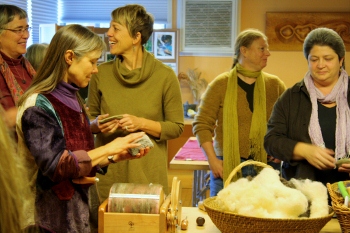 Farm-Based Educators Inspired by Anthroposophy (FBEIBA) describes a vocation of people who are:
Farm-Based Educators Inspired by Anthroposophy (FBEIBA) describes a vocation of people who are:
FBEIBA's purpose is to cultivate collegiality, networking, and best practices in this emerging field. We gather annually in the fall, in different regions of the country to further our mission.
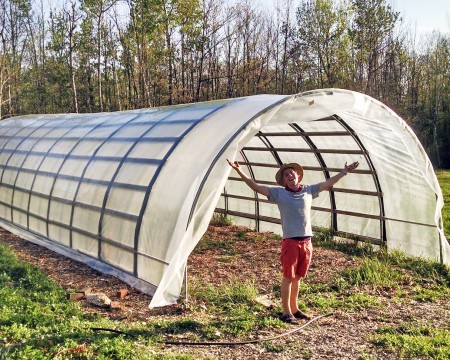 Abbot Hill in Wilton, New Hampshire, is home to High Mowing School, a Waldorf boarding high school, and Temple-Wilton Community Farm, one of the first biodynamic community supported agriculture (CSA) programs in the U.S. Also nearby is the Yggdrasil Land Foundation, an agricultural land trust committed to protecting biodynamic farmland. The result of such close proximity has been an extraordinarily collaborative project between High Mowing, which purchased farmland adjacent to its campus, and Yggdrasil, which purchased the conservation easement rights. The protected land is now used by the school, and is also leased to Temple-Wilton to support its grazing and feed needs.
Abbot Hill in Wilton, New Hampshire, is home to High Mowing School, a Waldorf boarding high school, and Temple-Wilton Community Farm, one of the first biodynamic community supported agriculture (CSA) programs in the U.S. Also nearby is the Yggdrasil Land Foundation, an agricultural land trust committed to protecting biodynamic farmland. The result of such close proximity has been an extraordinarily collaborative project between High Mowing, which purchased farmland adjacent to its campus, and Yggdrasil, which purchased the conservation easement rights. The protected land is now used by the school, and is also leased to Temple-Wilton to support its grazing and feed needs.
In the midst of all this activity, Brad Miller, a biodynamic farmer turned teacher at High Mowing, developed an innovative horticulture program that engages students in the many facets of stewarding land while learning life lessons from it. Katrina Steffek, RSF’s chief operating officer, spoke with Mr. Miller about what his students gained in their study of diversified and balanced farm ecosystems. Read the full interview here...
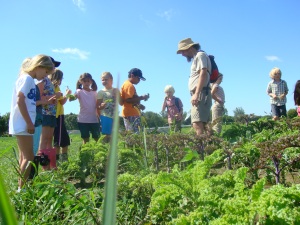
The Farm-Based Education Association (FBEA) was founded in 2006 in Shelburne, Vermont under the guiding language outlined here. The FBEA is an extremely valuable organization and resource and we encourage all FBEIBA participants to become members of the FBEA. Kim Wass attended both the FBEA conference and the FBEIBA retreat. She jotted down her reflections in an attempt to make distinctions between FBEA and FBEIBA following back to back 2011 conferences. Learn more...

by Erin Schneider
There is a garden in every childhood, an enchanted place where colors are brighter, the air is softer and the morning more fragrant than ever again. — Elizabeth Lawrence
This May I had the good fortune to accompany the third grade class from Prairie Hill Waldorf School on an overnight farm trip to Angelic Organics Learning Center in Caledonia, IL. The trip was the culmination of a year spent expanding their knowledge of the earth and the role that plants, animals, and humans serve on it. Throughout the year, third graders participated in daily chores, cared for a flock of chickens and collected their eggs, studied and built models of traditional shelters from around the world, built raised garden beds using hand tools, and planted a vegetable garden. Through these hands-on, experiential lessons, the children gained knowledge beyond that which is learned in books, deepening their connection to nature that leads to a greater sense of stewardship toward the earth. Read more...
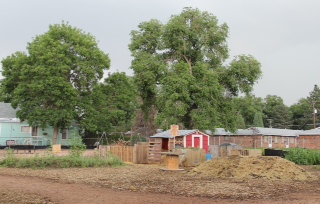
It takes a special kind of community to support a farmer who wants to take an acre-and-a-half, road-base parking lot and nurture it into an urban farm with biodynamics. At Mountain Song Community School, a public charter school that follows Waldorf methods inColorado Springs, Colorado, such a community exists and is pulling together to raise awareness concerning a priority for all of us — our food and how its grown. Read more...
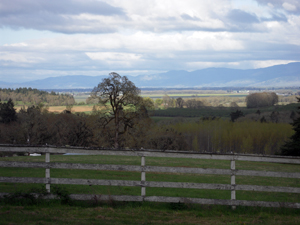 by Dana Burns
by Dana Burns
Over the lifetime of this country the percentage of the workforce who listed their primary occupation as ‘farmer,’ has gone from 90% of a total population of 3,929,214 in 1790 to less than 0.6% of the workforce of a population of 308,745,438 in 2010. Read More...
by Nicki Robb
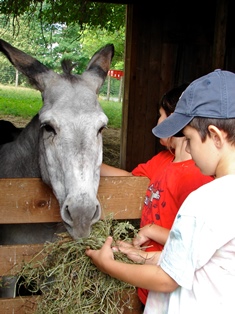
The Land Stewardship Program at the Hartsbrook School has, like the school itself, grown out of the very soil upon which this school is planted. More than 20 years ago, the fledgling program was slowly finding its way into the life and learning of our students, beginning as field trips to a local biodynamic farm (Brookfield Farm CSA) to join in a variety of seasonal planting and harvesting activities, then expanding to other area farms, patiently waiting for the opportunity where a full program could start to be realized at the school itself. Fast forward to today, with an almost full curriculum in place that encompasses the kindergarten, elementary, middle and high school, supporting students as they work and learn about the many pressing issues that affect our relationship with the earth. Learn more...
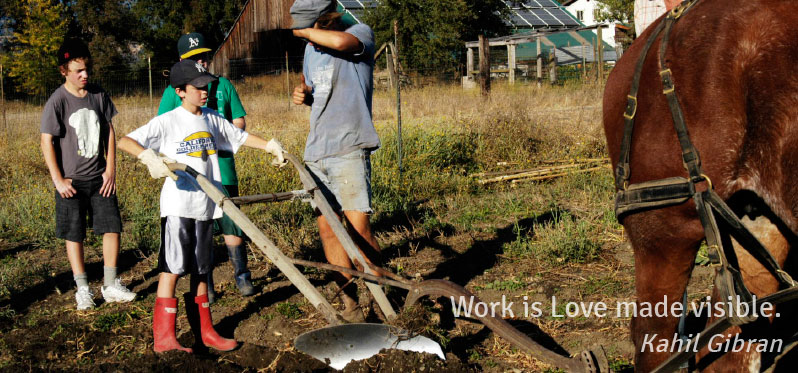
Live Power Community Farm offers the opportunity for elementary and secondary school classes to spend a few days on a working family farm. Since 1984, they have been the hosts for approximately 10 class visits a year, mostly, but not solely, from Waldorf schools and ranging from 1st- to 10th-grade classes, with some students returning one or more times during their school years.
Their goal during the children’s visits is to help them encounter and begin to form a relationship with the earth’s life, as expressed by the many different plants and animals that constitute the farm, and to afford them an opportunity to develop hands-on skills that give them a sense of the meaning of practical, productive work.
As farmers, we surround ourselves with plants and animals to which we contribute our time and energy. In caring for their needs and lives we become acquainted with their characters, qualities, and expressions. They provide our food and medicine and equally, or perhaps more importantly, they provide our inspiration.
Every plant and animal on the farm provides food or manure or nectar or shelter or something for another. The farm is a vast and constant interchange; a realm of sharing, giving, and serving. As farmers we become conscious participants in this exchange. We can bring water or manure where it is needed. We can prune or weed or protect. If this husbandry is performed carefully and thoughtfully, the plants and animals will respond bountifully.
We hope to imbue the students who visit our farm with a sense of this interconnectedness.
Visit the Live Power Community Farm website to learn more about the structure of their school program, as well as a list of farm activities and testimonials.
by Kelly Hogan, co-founder of Mother Earth School
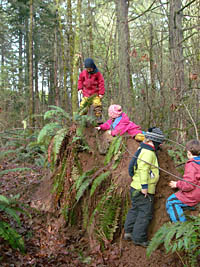
Mother Earth School started as an all-outdoor kindergarten class of Shining Star Waldorf School in fall 2007 held at Tryon Life Community Farm, an urban permaculture farm and sustainability education center in Portland, OR. In 2008, the Faery Garden Preschool was added and in 2009, both classes became Mother Earth School - a project of Tryon Life Community Farm and an evolving educational paradigm combining aspects of Waldorf education with permaculture practices and traditional living skills. The farm is surrounded by a 700 acre second growth forest (Tryon Creek State Park) and so the school has been a fusion of the European model of 'forest kindergarten' as well as homestead schooling. Learn more...

Angelic Organics Learning Center helps urban and rural people build local food systems. We offer opportunities to grow healthy food and a better quality of life, connect with farmers and the land, and learn agricultural and leadership skills. The Learning Center reaches more than 2,500 people each year through our programs at partner farms and urban growing sites in northern Illinois and southern Wisconsin. Learn more...
Looking for an educational center for a class field trip or family visit? As a member of the Biodynamic Association you have access to the Biodynamic Directory where you can find farms, biodynamic groups, educational centers, businesses, and others who share your interests or region. Join now!